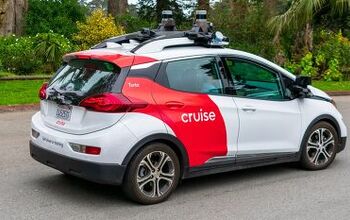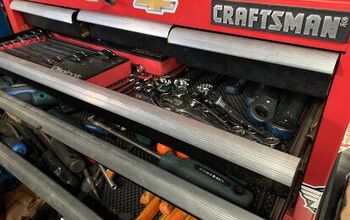Is The Chinese Car Market Showing Signs Of Slowing?
The rise of the Chinese auto market, which only surpassed the US to become the world’s largest in recent years, has drawn considerable attention from China-watchers and industry insiders alike. China’s rampant sales growth has paid huge dividends for firms who gambled on the Chinese market, in turn spurring more investment as every global automaker scrambles for access to China’s rapidly-developing market. As a result of several years of this gold rush mentality, everyone is now looking for China to stumble, to show the first signs of a bubble ready to burst.And over at Forbes, Handel Jones (the author of Chinamerica: The uneasy partnership that will change the world), thinks he may have found these first signs of slowdown in China’s auto production numbers.
Handel attributes the slowdown to three factors:
– The roads of the large cities, which represent the concentration of buying power for automobiles, are already highly congested. The fees for getting license plates in Shanghai are already over 50K yuan. One cannot imagine many more cars on the roads of Beijing, Shanghai, Guangzhou and Shenzhen. Even in the smaller cities, the traffic jams are becoming longer and longer. The potential speed of the cars is increasing, but the actual traveling speeds of cars in the large cities are slowing. It can oftentimes be faster to walk than to drive.
– Oil prices are increasing, with saturation in output from oil wells that are low-cost to operate. The oil imports of China are increasing, with increased competition for buying oil, which is resulting in prices per barrel of oil at the $112.00 level. Inflation has to be controlled, and oil and transportation costs affect many areas, including food costs.
– Cars need to be parked, and parking for cars is competing for space for people. Do car parks get built or do apartments get built?
Valid arguments, to be sure, but with Chinese car ownership still at 52 per 1,000 people, Handel’s brand of China-bear analysis remains a tough sell. On the larger level, however, the prospect of hundreds of millions of new cars taking to China’s roads has undeniable social, political, economic and environmental implications. Handel’s production data point is more likely to indicate a speedbump rather than a full-blown slowdown, but it’s never too early to consider the long-term evolution of the world’s largest car market.
More by Edward Niedermeyer
Latest Car Reviews
Read moreLatest Product Reviews
Read moreRecent Comments
- MaintenanceCosts I wish more vehicles in our market would be at or under 70" wide. Narrowness makes everything easier in the city.
- El scotto They should be supping with a very, very long spoon.
- El scotto [list=1][*]Please make an EV that's not butt-ugly. Not Jaguar gorgeous but Buick handsome will do.[/*][*] For all the golf cart dudes: A Tesla S in Plaid mode will be the fastest ride you'll ever take.[/*][*]We have actual EV owners posting on here. Just calmly stated facts and real world experience. This always seems to bring out those who would argue math.[/*][/list=1]For some people an EV will never do, too far out in the country, taking trips where an EV will need recharged, etc. If you own a home and can charge overnight an EV makes perfect sense. You're refueling while you're sleeping.My condo association is allowing owners to install chargers. You have to pay all of the owners of the parking spaces the new electric service will cross. Suggested fee is 100$ and the one getting a charger pays all the legal and filing fees. I held out for a bottle of 30 year old single malt.Perhaps high end apartments will feature reserved parking spaces with chargers in the future. Until then non home owners are relying on public charge and one of my neighbors is in IT and he charges at work. It's call a perk.I don't see company owned delivery vehicles that are EV's. The USPS and the smiley boxes should be the 1st to do this. Nor are any of our mega car dealerships doing this and but of course advertising this fact.I think a great many of the EV haters haven't came to the self-actualization that no one really cares what you drive. I can respect and appreciate what you drive but if I was pushed to answer, no I really don't care what you drive. Before everyone goes into umbrage over my last sentence, I still like cars. Especially yours.I have heated tiles in my bathroom and my kitchen. The two places you're most likely to be barefoot. An EV may fall into to the one less thing to mess with for many people.Macallan for those who were wondering.
- EBFlex The way things look in the next 5-10 years no. There are no breakthroughs in battery technology coming, the charging infrastructure is essentially nonexistent, and the price of entry is still way too high.As soon as an EV can meet the bar set by ICE in range, refueling times, and price it will take off.
- Jalop1991 Way to bury the lead. "Toyota to offer two EVs in the states"!

































Comments
Join the conversation
"The rise of the Chinese auto market, which only surpassed the US to become the world’s largest in recent years, has . . ." The Chinese auto market is only "larger" because it includes vehicles that are much smaller size, lower quality, fewer luxury features, fewer safety features, smaller engine capacity, smaller cargo capacity, etc. Many are little more than golf carts with windows. The US market is still larger in terms of cubic inches, horsepower, funtional bumpers (as opposed to hollow plastic shells), square inches of tread, cubic feet of passenger/cargo space, warranty coverage, etc. As I live and drive here in China, I could go on and on. But, it's comparing apples and oranges in all the ways that affect automotive goodness.
As China develops economically I think that car ownership levels will rise to levels comparable with more developed Asian countries like Korea, Japan and Taiwan. Car ownership levels in the dense cores of major cities will undoubtedly be lower but car ownership levels in the suburbs, second tier cities and rural areas are going to rise dramatically as incomes increase. Do not forget that in the outer suburbs of big cities like Beijing and Shanghai, traffic congestion is nowhere near the levels found in the city or inner suburbs and car is often much faster than public transport for suburb to suburb trips. I fully expect that Chinese cities will see a suburbanization trend similar to Tokyo for example. In second tier cities and rural areas where public transport is inferior/non existent and traffic congestion is not a problem there is massive room for growth as incomes increase.